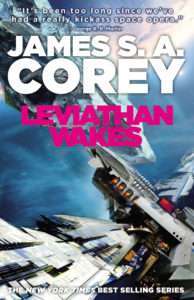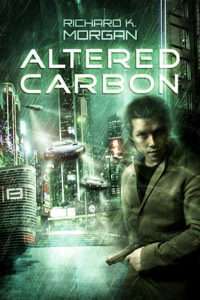Adrian Collins's Blog, page 107
February 7, 2023
REVIEW: Death Rider by Zamil Akhtar
Death Rider is a prequel novella for the Gunmetal Gods series by Zamil Akhtar, which is a Middle Eastern inspired grimdark fantasy with heavy eldritch overtones. We see the world from Darya’s point of view, a tribal warrior trying to break through the walls of a besieged city and end the war in the name of the Shah. She is assigned to the eponymous death riders; the tip-of-the-spear vanguard designed as fodder against the defending forces. Despite facing death many times, somehow, she continues to survive – is it luck, skill, or a guiding hand?
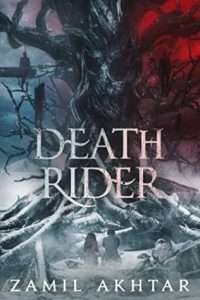 Having read Gunmetal Gods (#1) previously I thought I knew what to expect from Akhtar in this novella – powerful, many-eyed beasties revered as gods, blood, death, and ominous magic – but Death Rider veered off on a mind-bending detour that I did not see coming. Kudos to any author who can shakes things up like that! Darya’s persistent not-dying leads her to believe she is being shielded by a higher power as she tries to find a way to break the siege and get herself back into the good graces of the Shah, who has sent her on this impossible mission.
Having read Gunmetal Gods (#1) previously I thought I knew what to expect from Akhtar in this novella – powerful, many-eyed beasties revered as gods, blood, death, and ominous magic – but Death Rider veered off on a mind-bending detour that I did not see coming. Kudos to any author who can shakes things up like that! Darya’s persistent not-dying leads her to believe she is being shielded by a higher power as she tries to find a way to break the siege and get herself back into the good graces of the Shah, who has sent her on this impossible mission.
A lot rides on her shoulders, as she laments her lost love, how she might keep her grown children safe and to preserve her honour through a long and difficult campaign. As the solo POV of Death Rider, Darya works extremely well to bring us into the world and keep us hooked. She kills with efficiency and prowess as she makes her way to seize the princess-in- the-tower who could spell her triumph. Darya keeps her head when things start to get a little topsy-turvy and this is where Death Rider really shines.
Akhtar’s prose is quick, smooth, and engaging; he conjures some dark imagery and a profoundly in depth world in just 100 pages. More than just a story, Death Rider will make you think and wonder. As someone who has never been keen on Lovecraft’s work, I have to say Death Rider takes the tentacles and eyeballs for an exciting ride and is entirely worth the time to try out – especially as it’s available free from Akhtar’s newsletter. You do not need to have read any other books in the series before this. It is set much before the happenings of
Gunmetal Gods, with entirely different characters. It is a perfect introduction, and reminder, of the brilliantly dark worldbuilding and story-craft that Akhtar has brought to the fore in the series.
Rating: 4.5/5
Read Death Rider by Zamil AkhtarThe post REVIEW: Death Rider by Zamil Akhtar appeared first on Grimdark Magazine.
January 2023 Comics Highlights
2023 came out swinging strong with January’s comic book offerings. The pile to pull from was mighty, with more outstanding books than was entirely necessary. It feels like every publisher has something to prove, and they’re proving it. The art, writing, storylines and everything are firing on all cylinders leaving readers absolutely spoiled for choice.
Whether you’re after tried and true superheroics, horror, fantasy, adventure, or anything in-between there’s something for you out there and there are story arcs just ending, beginning, and digging deeper. 2023 is definitely going to be a high water mark for comics and if January is any indication I can’t wait to see what the rest of the year brings.
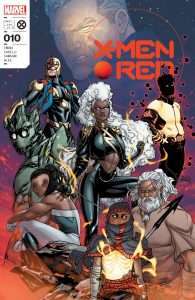 X-MEN RED #10 (Marvel)Al Ewing (W), Stefano Caselli & Jacopo Camagni (A), Federico Blee (C), Ariana Maher (L)
X-MEN RED #10 (Marvel)Al Ewing (W), Stefano Caselli & Jacopo Camagni (A), Federico Blee (C), Ariana Maher (L)While some people may question the overall quality of the current X-Men line, one of the most consistently excellent titles coming out for a while now has been X-Men Red and I think a lot of that is thanks to Al Ewing’s propensity for grand, epic narratives and colossal confrontations and action set pieces and all of that is put on huge display with the most recent issue. In a series that’s no stranger to outrageous action, we at last get a showdown between two of the most gut-wrenchingly powerful Omega mutants in the solar system: Vulcan and Storm. The battle itself is amazing, portrayed with astounding detail by Caselli and Camagni, and brought to vivid life with Blee’s colors. It scours the face of Arakki (once Mars), and you may or may not be surprised at its outcome—also, we see fallout of Abigail Brand’s clandestine machinations at last as the series’ first major arc comes to a close. If you haven’t been following X-Men Red, now would be a good time to jump on as it looks to begin a new arc.
Read X-Men Red #10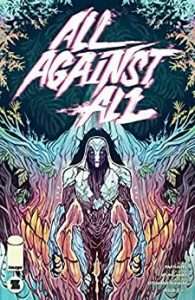 ALL AGAINST ALL #2 (Image)Alex Paknadel (W), Caspar Wijngaard (A/C), Lassan Otsmane-Elhaou
ALL AGAINST ALL #2 (Image)Alex Paknadel (W), Caspar Wijngaard (A/C), Lassan Otsmane-ElhaouI love a good, weird science fiction story and All Against All has more than satisfied that itch with its first and now second issue. The premise alone is enough to intrigue, with aliens having come to some kind of post-apocalyptic version of Earth to observe its biospheres and create weapons for their own mysterious extraterrestrial conflict. The questions are huge, the answers are cunningly delivered in bits and pieces, but the art in All Against All is a joy to behold. Wijngaard’s pages are, honestly, beautiful and his compositions are a breath of fresh air as the art and the story moves along at an impressive clip. The issue itself ends on a big moment, and it feels like the action is about to hit a major tipping point, which makes sense as the miniseries is set for five issues and I can’t wait for the next installment.
Read All Against All #2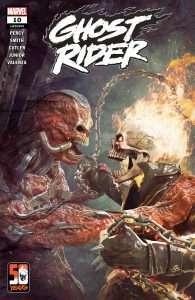 GHOST RIDER #10 (Marvel)Benjamin Percy (W), Cory Smith (A), Oren Junior (I), Bryan Valencia (C), Travis Lanham (L)
GHOST RIDER #10 (Marvel)Benjamin Percy (W), Cory Smith (A), Oren Junior (I), Bryan Valencia (C), Travis Lanham (L)The end of Ghost Rider’s first major arc closes with a huge confrontation, gore and action, and a big DUN-DUN-DUN moment to close it all out on and setup what’ll be coming next. I’ve said it before, but I’m a giant Ghost Rider fanboy and was pretty apprehensive when a new series got announced but over the course of these last tens issues those anxieties were certainly put to rest. I love that Percy ad Smith have embraced Ghost Rider’s horror roots and don’t shy away from touchy, otherwise sensitive subject matter. They embrace it, and use it effectively, creating a story of horror and suspense that has been exhilarating to read. Ghost Rider continues to be a consistently excellent book, and looks to continue that theme with its next arc.
Read Ghost Rider #10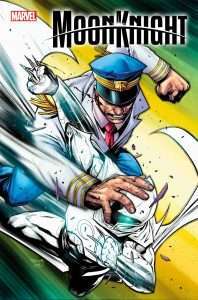 MOON KNIGHT #19 (Marvel)Jed MacKay (W), Federico Sabbatini (A), Rachelle Rosenberg (C), Cory Petit (L)
MOON KNIGHT #19 (Marvel)Jed MacKay (W), Federico Sabbatini (A), Rachelle Rosenberg (C), Cory Petit (L)Speaking of books that are consistently excellent: Moon Knight is like the book that can’t lose (knock on wood). Under the careful stewardship of MacKay, it’s been quite probably the single best book Marvel’s putting out right now with every single issue knocking it out of the park. This newest chapter sets up the opening overture of the new arc, and promises great, terrible things to come for Moon Knight and crew, his little makeshift family of misfits. A great time for new readers to jump on, Moon Knight has something for everyone with action, intrigue, mystery, comedy, and more. I could gush all day about this book, but I think it’s better to let it speak for itself and say Moon Knight is a title you should definitely not be sleeping on.
Read Moon Knight #19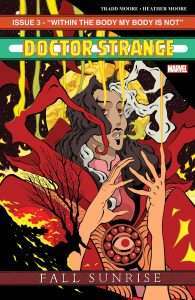 DOCTOR STRANGE: FALL SUNRISE #3 (Marvel)Tradd Moore (W/A), Heather Moore (C), Clayton Cowles (L)
DOCTOR STRANGE: FALL SUNRISE #3 (Marvel)Tradd Moore (W/A), Heather Moore (C), Clayton Cowles (L)Listen, I’m a simple guy. I hear there’s a book being done by Tradd Moore, I go out and I get that book because I know that no matter what at least the thing is going to look damn good, and Doctor Strange: Fall Sunrise is probably one of the most artistically impressive books I’ve picked up in a long time. Filled with Moore’s signature, insanely detailed work, it tells one of the most esoteric Doctor Strange stories ever with themes of philosophy and metaphysics building an intriguing narrative that’s easy to lose yourself in—if you don’t lose yourself in the art, first. It’s hard to even describe, if you haven’t experienced the kinds of layouts and tableaus that Moore creates. Doctor Strange: Fall Sunrise is, ultimately, just that: an experience, and one that shouldn’t be missed. It’s a joy to behold, to fall into, and lose yourself poring over, absorbing every little thing in its pages. I can’t wait for the next installment.
Read Doctor Strange: Fall Sunrise #3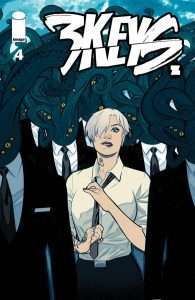 3KEYS #4 (Image)David Messina (W/A), Alessandra Alexakis (C), Shawn Lee (L)
3KEYS #4 (Image)David Messina (W/A), Alessandra Alexakis (C), Shawn Lee (L)I’m a big Cthulhu Mythos nerd and I can say, definitively, that 3KEYS is probably the single coolest interpretation of Lovecraft’s universe I have ever seen. Emphasis on “seen.” David Messina’s art is, in a word (or two), freaking cool. Even if it were presented as a wordless and totally visual narrative, 3KEYS would still be one of the most enjoyable books being put out on the stands every month simply on the strength of its stunning visuals. The art, the aesthetic, the colors, they’re all brilliant and then you go ahead and get a story and characters that are awesome and engrossing, and it becomes this book that everyone should be reading. It’s fun, it’s exciting, it’s, cathartically visceral and far and away one of the most original interpretations of sweeping stretches of Lovecraft’s oeuvre. I’ve fallen head over heels for this book, and can’t recommend it enough. The only problem? 3KEYS is ending next month, and that absolutely guts me. But, if the previous issues are anything to go by, it’ll be one hell of a climax.
Read 3KEYS #4The post January 2023 Comics Highlights appeared first on Grimdark Magazine.
February 6, 2023
There’s a Monster in the House (and it is us)
It is often asserted that Mary Shelley gave life to modern speculative fiction with her masterpiece Frankenstein. If this is so, it can be further argued that grimdark swirls deep in the DNA of all modern speculative fiction.
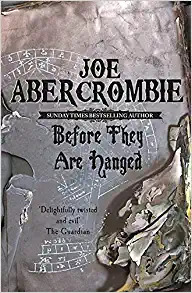 And we love it. Time and again we fling ourselves into the pit with Frankenstein’s monster, with Glokta and his knives, with monsters and mad scientists and imperfectly understood alien technology. We glut ourselves on horror and despair.
And we love it. Time and again we fling ourselves into the pit with Frankenstein’s monster, with Glokta and his knives, with monsters and mad scientists and imperfectly understood alien technology. We glut ourselves on horror and despair.
Why should this be so? Why, in a musty old bookstore filled with tales of derring-do True Kings and Good Witches, would we ever reach for stories that make us wince or weep? Why reach for the bitter cup instead of sweet?
It’s almost as if we know that both cups have been poisoned, that the sweet wine is a lie.
Blake Snyder, known for his ‘Save the Cat’ beat sheet template for storytelling, describes a subgenre that he names ‘Monster in the House’. In this story genre our hero is trapped in an inescapable venue (the house) and menaced by an implacable danger (the monster). In order to survive, the hero must: a) defeat the monster; and b) escape the house. Unfortunately, neither of these is possible until the hero has been wrecked and remade in a new, darker image of themselves.
Worse, the monster only exists at all because the hero has created it. Victor Frankenstein, in his hubris, challenged the throne of God in his attempts to bring forth life from cold clay. Glokta chooses to inflict upon others the same horror that unmade him. We choose to watch as tragically fallible human beings raise the dead, commit all manner of atrocities, plunge worlds into war, and suffer for it.
We suffer along with them, and find ourselves entertained.
Why? Why do this to ourselves? Why, when the torturer pulls a hot poker from the fire, do we not set aside that book in favor of bright elves and sweet Hobbitses? Why, when the brat king shoots a whore full of bolts, do we not hit the remote and watch Willow for the umpteenth time?
Why do we decide, time and again, to trap ourselves in the house with these monsters?
Perhaps, as it has been opined, we wish to expose our limbic systems to fear, horror, and grief so that we may build grit and resilience by surviving these harrowing experiences. Perhaps we wish to distract ourselves from a sometimes terrible and terrifying reality.
After all, what is end stage capitalism and climate change when compared to a planet-devouring protomolecule?
I suspect the reason is deeper.
And darker.
It can be argued that humans suffer mental anguish when our actions are not in harmony with our ideals. And we, perverse creatures that we are, consistently elect sin over sainthood. We tyrannize and destroy our neighbors, our planet, ourselves. We rape, plunder, and pillage our way to a throne, crown ourselves in stolen gold, and then eat, drink and whore ourselves into an early grave. We drink stolen water from plastic bottles which choke the life from our oceans, drive ridiculous vehicles that steal the oxygen from our own lungs. Every generation sews together bits and pieces of the Nazi dream and tries to breathe new life into a dead nightmare.
We could embrace life, love, and light. We could bottle the light of the stars, plant trees of silver and gold, unfurl our wings and soar into a land of peace and prosperity.
But we won’t. We will always create the monster and then lock ourselves in the house with it. Because, as Agent Kay tells us, “People are dumb, panicky, dangerous animals and you know it.”
Mary Shelley knew it, too.
Out loud, we tell ourselves that we want True Kings and Bold Heroes and Virtuous Rulers, but down deep in the muck of our DNA, we know that we neither deserve nor truly desire that glittering castle in the sky.
So lock yourself within the house of pain and bring forth the monster from your tortured, dissonant, too-human soul.
It’s not your fault, poor creature—you were made this way.
The post There’s a Monster in the House (and it is us) appeared first on Grimdark Magazine.
February 5, 2023
REVIEW: New Edge Sword and Sorcery Magazine
Genre labels are funny, aren’t they? Grimdark. Cyberpunk. Hopepunk? ‘Swords-and-sorcery’ has been bandied about for almost a century, and still the average consumer doesn’t know what the hell it is. Does it have swords? And sorcery? Must be sword and sorcery, right? Nah. Not really, but that’s an argument for another day. What’s important is that sword and sorcery is back and screaming for vengeance! Readers who prefer outsider protagonists, cruel sorcery, and a hearty helping of Weird now have options beyond what was popular in the 30s and 70s. That’s right; we may well be facing a third wave of the genre that brought us Conan, Kane, and Elric! One such publication offering new and exciting tales of flashing blades and eldritch evils is New Edge Sword and Sorcery Magazine.
Dear reader, it’s absolutely worth your time.
Editor Oliver Brackenbury has assembled an impressive ToC for this first issue (#0). Beyond the striking cover (by fantasy artist Gilead), you’ll find beautifully laid out pages filled with stunning art, fast fiction, and persuasive essays that probe and highlight various aspects of the genre. Every entry is strong, but there were a few standouts for me.
Dariel R. A. Quiogue’s tale of Orhan Timur is pure old-school S&S, deeply rooted in its historic influences. Its words are worth a thousand pictures, and you can all but feel the cool wind of the steps blowing through your hair. Those who dig Robert E. Howard and Harold Lamb will surely enjoy The Curse of the Horsetail Banner.
The non-fiction standout for me is C. L. Moore and Jirel of Joiry: The First lady of Sword & Sorcery by Cora Buhlert. Though I host a sword and sorcery podcast called Rogues in the House, I was woefully ignorant to the career of C.L. Moore and the adventures of her trail-blazing heroine, Jirel of Joiry. Buhlert’s essay goes a long way in educating readers about these seminal tales.
Exquisite art has always accompanied these sorts of adventure tales, so any good sword and sorcery magazine worth its salt must bring the visual goods. This first issue is bursting with excellent black and white illustrations from folks all over the globe. Hardeep Aujla and Morgan King’s pieces stood out for me, taking me back to a time before robots who can’t draw hands got into the mix. Yeah, I said it.
While the entries in the magazine are strong on their own merits, it’s worth noting the magazine’s ethos is as a blazing banner, literally defined and laid out in detail. Sword and sorcery has a tradition of fleet storytelling and strong protagonists, where underdogs can, and often do, triumph over laughable odds. These tales are rarely concerned with world-shaking stakes, instead focusing on human desires and inclinations. This genre has also, like so much of what was written in the past century, offered some unseemly racist and sexist content, some of it beyond just the “views of its day”.
To focus on what makes S&S truly shine, Brackenbury has leaned into the human element, the outsider’s perspective, and the thunderous, thrilling trappings of high adventure yarns. The magazine also puts in the work to boost voices of those traditionally underserved and underrepresented in genre fiction.
One might hear this and suggest it’s the quality of the stories that ultimately matters. I agree! But it’s a fake idea to suggest you have to sacrifice quality for variety, and I would also add that storytelling is richer when we’re treated to tales by those outside our immediate demographics. I found ample proof of that in New Edge Sword and Sorcery Magazine, and so can you.
 Meanwhile, the presence of a story by S&S veteran David C. Smith, and non-fiction by S&S scholars Howard Andrew Johnson and Brian Murphy, makes it pretty clear they’re only looking to add people to the genre, not cut them out. “Made with love for the classics, and an inclusive, boundary-pushing approach to storytelling” is the short version of their ethos, seen even in their badass battle-axe logo that looks to both the genre’s past and future.
Meanwhile, the presence of a story by S&S veteran David C. Smith, and non-fiction by S&S scholars Howard Andrew Johnson and Brian Murphy, makes it pretty clear they’re only looking to add people to the genre, not cut them out. “Made with love for the classics, and an inclusive, boundary-pushing approach to storytelling” is the short version of their ethos, seen even in their badass battle-axe logo that looks to both the genre’s past and future.
The digital formats of issue #0 are available for the low price of FREE; or you can pick-up a soft or hardcover copy via Amazon for the cost of printing. You can find all of that through www.newedgeswordandsorcery.com.
There’s also a 30 day Kickstarter for issues #1 and 2 and that absolutely warrants your contributions. Issue #1 even includes a brand new story by fantasy legend Michael Moorcock! Check out the Kickstarter campaign page to see who the other 20 authors, and 19 artists, are.
The post REVIEW: New Edge Sword and Sorcery Magazine appeared first on Grimdark Magazine.
February 4, 2023
REVIEW: The Tyranny of Faith by Richard Swan
In The Tyranny of Faith by Richard Swan, our protagonist Helena, Vonvalt, and his retainers travel from Galen’s Vale to the empire’s capital of Sova to unravel the pit of treachery it has become. Old mentors and leaders, and some of the very most senior justices in Vonvalt’s Order of Magistrates must be cut from the body of the empire, lest they poison if further. And if the treachery and intrigue and action stopped there this would still be a very good book. But because it’s a fucking great book, it doesn’t stop there.
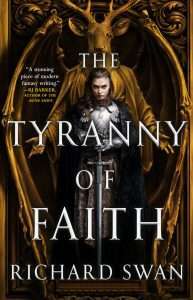 The Tyranny of Faith has a little something for every kind of dark fantasy fan. Intrigue, political manoeuvring, necromancy and other vicious magics used for both good and evil, small personal vicious fights and epic battles, and brilliantly well-fleshed out characters on all sides of the story. As we travel to Sova and experience something akin to the halls of Rome in Gladiator and then to the frontier fortress of Keraq which reminded me so much of Kingdom of Heaven, we are treated to a brutal, intensely personal, at times darkly funny (in an Abercrombie way), story about the collapse of the empire, and the degradation of the people who try to prop it up.
The Tyranny of Faith has a little something for every kind of dark fantasy fan. Intrigue, political manoeuvring, necromancy and other vicious magics used for both good and evil, small personal vicious fights and epic battles, and brilliantly well-fleshed out characters on all sides of the story. As we travel to Sova and experience something akin to the halls of Rome in Gladiator and then to the frontier fortress of Keraq which reminded me so much of Kingdom of Heaven, we are treated to a brutal, intensely personal, at times darkly funny (in an Abercrombie way), story about the collapse of the empire, and the degradation of the people who try to prop it up.
In The Tyranny of Faith Helena follows her mentor Vonvalt and his retinue into danger. Helena as a character is excellent and well thought out. She is principled as only the young can be, and her journey of starting to see the world and the people around her more realistically against the principles she thought they stood for is a riveting one. Her relationships with the three men in her party are well fleshed out, with each playing a role in her growth throughout, while also going through their own pain and growth in return.
One of the things I really enjoyed about the early stages of The Tyranny of Faith is how Swan’s history as a lawyer shines through in showcasing how the Order of Magistrates works. How people talk, what they value, and what drives them shines through in the way only authors with lived experience seem to manage. I’m not sure if it’s my own white collar career upbringing in what’s essentially project management kicking in here, but seeing the workings of a place like that–that isn’t the standard senate setting that’s in plenty of books–just makes me happy at this age. That and logistics, which Swan also seems to consider beyond a surface level throughout his books, really just add nice depth and nuance to the world.
As a book two in a series, The Tyranny of Faith is almost perfect. In my eyes it’s a slightly better book than The Justice of Kings (which I’m pretty sure I five-starred, so this is awkward) and it doesn’t rely on heavy clumsy exposition to remind you of all the things in book one that matter to book two. Swan ramps up the stakes throughout the story presented in the pages of The Tyranny of Faith, and also makes damned sure that just about every reader is going to be chomping at the bit for book three to land. Try as I might, I actually don’t have a negative word to say about it.
The Tyranny of Faith is an absolutely unputdownable read. Swan ramps up the awesomeness of The Justice of Kings by giving readers more of what we loved in book one, and then building on it in book two. The emotional hits are harder, the action is bloodier, the magic out of control, and the stakes just keep going up as the tens of millions of people in The Empire of the Wolf are set up to be torn down.
5/5
Read The Tyranny of Faith by Richard SwanThe post REVIEW: The Tyranny of Faith by Richard Swan appeared first on Grimdark Magazine.
February 2, 2023
REVIEW: To Shape a Dragon’s Breath by Moniquill Blackgoose
In a grim world damaged by dragon wars, colonization, and industrialization, To Shape a Dragon’s Breath follows the story of a young Indigenous girl who becomes the hope of her people. Instead of Dragon rider, her people call her Nampeshiweisit. Throughout the book, Blackgoose digs up the older roots of fantasy and plants new life with original ideas, growing this novel into a stronger, more thoughtful story. In a whaling village, a girl watches as a rare dragon leaves its egg. It hatches in front of Anequs, who finds herself in a bond with a baby dragon. Anequs is led into the horrid, complicated politics between her people and the colonial government, which requires that she train in dragoneering at a dragon academy, far away from her people.
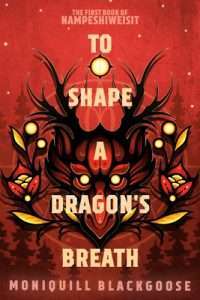 At Kuiper’s Academy of Natural Philosophy and Skiltakraft, students learn all about dragon academics. The sciences, philosophies, and engineering of the nineteenth century become the basis for this empirical dragon school, where tweedy teachers make the average black-gowned fantasy professor look like an angel. But where the typical fantasy makes boarding schools seem like a cozy academic fairytale, Blackgoose makes this academic colonial horror into reclaiming power.
At Kuiper’s Academy of Natural Philosophy and Skiltakraft, students learn all about dragon academics. The sciences, philosophies, and engineering of the nineteenth century become the basis for this empirical dragon school, where tweedy teachers make the average black-gowned fantasy professor look like an angel. But where the typical fantasy makes boarding schools seem like a cozy academic fairytale, Blackgoose makes this academic colonial horror into reclaiming power.
Anequs and her dragon, Kasaqua, leave their whaling village for the steam trains of the Anglish world. I imagined this world as an epic industrial society if the Vikings lived in the Victorian age. Following the requirements of the Ministry of Dragon Affairs, Anequs studies anglereckoning and other magical academia to graduate in dragoneering. Blackgoose puts industrious thought into how the magic works. This is an intensely nerdy book—full of theories, mathematics, devices, and the wacky scientists who make them. Add that up with dragons and oral storytelling, To Shape A Dragon’s Breath made for a fun, smart read. Blackgoose brings a daring, entirely hot, take on dragonriders and worldbuilding that outshine what I’ve previously read. I love a fantasy author that pokes, prods, and questions the genre. That storytelling puts a different perspective, embracing what fantasy is truly about. It encourages growth over stagnation.
Characters in To Shape a Dragon’s Breath command the story. Blackgoose makes every character with even the smallest scenes captivating with intriguing, interesting details about them. Existing in this grunge civilization, Anequs experiences a world where everything is unkind and brutal compared to the softness of her home. While the Anglish see progress through their rose-tinted glasses, she sees atrocity, broken laws, and prejudice. Fantasy and dragons give her perspective another layer in a frightening fantasy world that truly feels like a cultural shock. Tight corsets, anthropologists treating her existence at the academy as an experiment, spending time with her lady amour in private, and restrictive rules for women and queer people all frustrate Anequs. Truly, you can feel the fire within in a world like that.
Not only does the world feel real, but the characters have personalities beyond their dragons. Anequs is both a clever protagonist and a delightfully rageful one in equal measure. I am charmed by her unfiltered tongue, like her confusion about expressing love in public or her grumblings about women having to wear such restrictive clothing. I like that she does not conform or feel sorry for refusing to conform to their culture’s expectations of her. She’s so wonderfully dry-humored in a dark world, which is exactly the balance I look for in a great dark fantasy novel. There’s a genuine feeling that she wants to follow in the footsteps of her ancestors, and points out that there is nothing wrong or backward about that. But as a student she is confronted with the poisonous attitudes the Anglish have about her people, making her increasingly invested in her people’s liberation.
Every character in To Shape a Dragon’s Breath is fully realized—some have quirks, oddities, family obligations, dislikes, tempers, and money to earn. I enjoyed seeing that the author wrote such nuanced, complicated queer and disabled characters, including a teacher who fought in a dragon war. And all of them are imperfect and flawed. The relationships are richly written too, be it father and daughter or grumpy classmates to good friends. My favorite is Theod, who when first introduced to Anequs says “I am the offspring of murderers.” His prickly relationship with her turns into something very deep and full of heartache, which readers will particularly be
pulled towards. I am used to Fantasy novels that portray a dark world where sensitive feelings are portrayed as unimportant and weak. I love that Blackgoose shows characters feelings towards courtship or towards family as something to appreciate. The development of everyone in To Shape a Dragon’s Breath felt visible as clear glass.
To Shape a Dragon’s Breath is one blazing epic gulp of a fantastic tale. Queer, anticolonialist, and full of dragons. Moniquill Blackgoose’s writing is easy to love: cutthroat, smooth, and reminds me of a story being told over an open fire.
Read To Shape a Dragon’s Breath by Moniquill BlackgooseThe post REVIEW: To Shape a Dragon’s Breath by Moniquill Blackgoose appeared first on Grimdark Magazine.
February 1, 2023
REVIEW: Untethered Sky by Fonda Lee
Untethered Sky is Fonda Lee’s delicate coming-of-age novella inspired by Persian and Arabian folklore, featuring two beasts from Middle Eastern mythology: manticores and rocs. The manticore, which derives its name from the Persian word for “man-eater,” is a fearsome beast with a human-like head, the body of a lion, and a scorpion-like tail. It delights in feeding on humans, with the screams of its victims only fueling its thirst for carnage. In Untethered Sky, the manticore has only one natural predator: the giant bird known as the roc. The roc, which appears in both Arabian and Persian mythology, is essentially a supersized falcon that can be trained to hunt a variety of beasts, including the manticore.
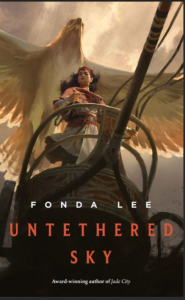 Untethered Sky is told from the first-person perspective of Ester, a girl who lost both her mother and brother to a rampaging manticore. With the manticore’s sinister, heterochromic eyes emblazoned in her memory, Ester makes it her life’s mission to hunt and kill manticores by training as a ruhker, i.e., a professional roc trainer. The job of a ruhker is highly dangerous, since any miscommunication with the roc could lead it to attack its handler. Only about one in five apprentices are able to complete their training and become a successful ruhker.
Untethered Sky is told from the first-person perspective of Ester, a girl who lost both her mother and brother to a rampaging manticore. With the manticore’s sinister, heterochromic eyes emblazoned in her memory, Ester makes it her life’s mission to hunt and kill manticores by training as a ruhker, i.e., a professional roc trainer. The job of a ruhker is highly dangerous, since any miscommunication with the roc could lead it to attack its handler. Only about one in five apprentices are able to complete their training and become a successful ruhker.
The first part of Untethered Sky focuses on Ester’s apprenticeship. The most important aspect of her training is to build a trusting relationship with her adolescent roc, Zahra. I was especially touched by the respect and thoughtful care exhibited by Ester in all her interactions with Zahra.
As in her Green Bone Saga, Fonda Lee excels at nuanced characterization of complex interpersonal relationships. In Untethered Sky, these relationships include those between ruhkers and rocs and amongst the ruhkers themselves. All these relationships are built on mutual respect and collegiality but with an unspoken barrier preventing deeper connections. The cautiously affectionate interactions between Ester and her fellow ruhker Darius are especially poignant.
Another major theme in Untethered Sky is the relationship between humankind and the natural world. The ruhkers cultivate a respectful, personal relationship with their rocs, never considering themselves to have any ownership over the giant birds. This attitude contrasts with that of the local government officials who seek to leverage the rocs in a more organized, militaristic fashion to exterminate the manticores. Whereas the ruhkers give all the credit for manticore-hunting to their beloved rocs, the officials are quick to attribute their success to human skill and ingenuity.
With Untethered Sky, Fonda Lee shows her maturity and versatility as an author. Her writing is precise and poetic, with every word skillfully chosen. Combined with its gentle didacticism, Untethered Sky has the feeling of a classic folktale. Whereas the Green Bone Saga showcased Fonda Lee’s ability to write pulse-pounding action in the world of organized crime, in Untethered Sky she demonstrates quiet restraint. Her more minimalistic approach in this novella works every bit as effectively as the grander scale she employed in Jade City and its sequels.
Untethered Sky is a beautifully crafted gem of a novella, which reinforces Fonda Lee’s standing as one of the most talented authors in fantasy today. The Middle Eastern-inspired setting is an ideal backdrop for Lee’s tale, which gently interweaves fantastical elements in this graceful story about the nature of humanity, our relationships with each other, and humankind’s place in the natural world. Fonda Lee’s understated approach is the perfect vehicle for this moving novella about rising from tragedy to find one’s true calling.
5/5
Read Untethered Sky by Fonda LeeThe post REVIEW: Untethered Sky by Fonda Lee appeared first on Grimdark Magazine.
Review: Untethered Sky by Fonda Lee
Untethered Sky is Fonda Lee’s delicate coming-of-age novella inspired by Persian and Arabian folklore, featuring two beasts from Middle Eastern mythology: manticores and rocs. The manticore, which derives its name from the Persian word for “man-eater,” is a fearsome beast with a human-like head, the body of a lion, and a scorpion-like tail. It delights in feeding on humans, with the screams of its victims only fueling its thirst for carnage. In Untethered Sky, the manticore has only one natural predator: the giant bird known as the roc. The roc, which appears in both Arabian and Persian mythology, is essentially a supersized falcon that can be trained to hunt a variety of beasts, including the manticore.
 Untethered Sky is told from the first-person perspective of Ester, a girl who lost both her mother and brother to a rampaging manticore. With the manticore’s sinister, heterochromic eyes emblazoned in her memory, Ester makes it her life’s mission to hunt and kill manticores by training as a ruhker, i.e., a professional roc trainer. The job of a ruhker is highly dangerous, since any miscommunication with the roc could lead it to attack its handler. Only about one in five apprentices are able to complete their training and become a successful ruhker.
Untethered Sky is told from the first-person perspective of Ester, a girl who lost both her mother and brother to a rampaging manticore. With the manticore’s sinister, heterochromic eyes emblazoned in her memory, Ester makes it her life’s mission to hunt and kill manticores by training as a ruhker, i.e., a professional roc trainer. The job of a ruhker is highly dangerous, since any miscommunication with the roc could lead it to attack its handler. Only about one in five apprentices are able to complete their training and become a successful ruhker.
The first part of Untethered Sky focuses on Ester’s apprenticeship. The most important aspect of her training is to build a trusting relationship with her adolescent roc, Zahra. I was especially touched by the respect and thoughtful care exhibited by Ester in all her interactions with Zahra.
As in her Green Bone Saga, Fonda Lee excels at nuanced characterization of complex interpersonal relationships. In Untethered Sky, these relationships include those between ruhkers and rocs and amongst the ruhkers themselves. All these relationships are built on mutual respect and collegiality but with an unspoken barrier preventing deeper connections. The cautiously affectionate interactions between Ester and her fellow ruhker Darius are especially poignant.
Another major theme in Untethered Sky is the relationship between humankind and the natural world. The ruhkers cultivate a respectful, personal relationship with their rocs, never considering themselves to have any ownership over the giant birds. This attitude contrasts with that of the local government officials who seek to leverage the rocs in a more organized, militaristic fashion to exterminate the manticores. Whereas the ruhkers give all the credit for manticore-hunting to their beloved rocs, the officials are quick to attribute their success to human skill and ingenuity.
With Untethered Sky, Fonda Lee shows her maturity and versatility as an author. Her writing is precise and poetic, with every word skillfully chosen. Combined with its gentle didacticism, Untethered Sky has the feeling of a classic folktale. Whereas the Green Bone Saga showcased Fonda Lee’s ability to write pulse-pounding action in the world of organized crime, in Untethered Sky she demonstrates quiet restraint. Her more minimalistic approach in this novella works every bit as effectively as the grander scale she employed in Jade City and its sequels.
Untethered Sky is a beautifully crafted gem of a novella, which reinforces Fonda Lee’s standing as one of the most talented authors in fantasy today. The Middle Eastern-inspired setting is an ideal backdrop for Lee’s tale, which gently interweaves fantastical elements in this graceful story about the nature of humanity, our relationships with each other, and humankind’s place in the natural world. Fonda Lee’s understated approach is the perfect vehicle for this moving novella about rising from tragedy to find one’s true calling.
5/5
Read Untethered Sky by Fonda LeeThe post Review: Untethered Sky by Fonda Lee appeared first on Grimdark Magazine.
January 31, 2023
REVIEW: Gothic by Philip Fracassi
Philip Fracassi’s new horror novel Gothic opens with its protagonist Tyson Parks trapped in an untenable situation. Twenty years ago he was a New York Times bestselling horror author, hailed as Stephen King’s heir apparent. But times have changed and his more recent books have been commercial and critical failures. His smug Manhattan agent—lounging in the posh corner office Tyson’s labor and talent financed—berates him like a child for falling out of step with the fickle tastes of the fiction market. Tyson’s latest manuscript is both late and diverges significantly from the book he pitched to his anxious publisher. The creative well is running dry and his business partners are growing impatient while his debts mercilessly compound.
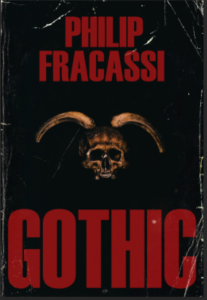 Tyson’s fortunes change, however, when his supportive partner Sarah buys him an ornate Victorian Gothic writing desk as a present for his 59 th birthday. A smoothly polished stone slab supported by decadently engraved rosewood, the monumental antique is intended to reignite Tyson’s creative spark. And it works, beyond Sarah’s wildest hopes. From the moment Tyson sets fingertips to keyboard, he is drawn into a fugue state in which the words flow easily and the hours slip by, leaving him pages of disturbingly compelling tales of witchcraft and human sacrifice. Publishable pages. But while his writing career makes a dramatic recovery, his personal life takes a drastic turn for the worse. After receiving the desk, loyal family man Tyson finds himself growing distant and dismissive towards his friends and loved ones, even gradually becoming paranoid and outright violent. A new, malignant Muse is his constant companion. If that wasn’t enough, in addition to the desk’s dark influence, Tyson finds himself targeted by Diana, the mysterious and ruthless last scion of the aristocrat who originally owned the artifact. For the desk is, in reality, a repurposed altar dedicated to blasphemous occult rituals.
Tyson’s fortunes change, however, when his supportive partner Sarah buys him an ornate Victorian Gothic writing desk as a present for his 59 th birthday. A smoothly polished stone slab supported by decadently engraved rosewood, the monumental antique is intended to reignite Tyson’s creative spark. And it works, beyond Sarah’s wildest hopes. From the moment Tyson sets fingertips to keyboard, he is drawn into a fugue state in which the words flow easily and the hours slip by, leaving him pages of disturbingly compelling tales of witchcraft and human sacrifice. Publishable pages. But while his writing career makes a dramatic recovery, his personal life takes a drastic turn for the worse. After receiving the desk, loyal family man Tyson finds himself growing distant and dismissive towards his friends and loved ones, even gradually becoming paranoid and outright violent. A new, malignant Muse is his constant companion. If that wasn’t enough, in addition to the desk’s dark influence, Tyson finds himself targeted by Diana, the mysterious and ruthless last scion of the aristocrat who originally owned the artifact. For the desk is, in reality, a repurposed altar dedicated to blasphemous occult rituals.
The clever conceit at the heart of Gothic is that it is an unabashedly old school horror novel about an old school horror novelist. It’s a book that the reader can easily envision Tyson Parks writing himself at the height of his popularity. Tyson may be struggling because he’s behind the times, but Gothic celebrates the era when writers like him were most successful, when names like Stephen King, Dean R. Koontz, and Peter Straub adorned every drugstore paperback spinner rack. Fracassi wisely avoids directly aping King’s voice and tics, but King in particular is referenced multiple times in the book. The writer’s descent into madness immediately brings to mind The Shining, and the seductive, haunted artifact that gives with one hand while exacting a terrible price with the other reminds the reader of a certain cursed possessed car. In fact, this parallel is amusingly lampshaded by Tyson’s best friend, Billy: “Can you believe it Tyson? It’s like Christine…but wood!”
While Gothic is clever and occasionally referential, it doesn’t go overboard on postmodernism or irony. It takes a somewhat silly premise—haunted furniture—and combines it with familiar (some might even say played-out) gothic horror elements like warlocks, moonlit ritual sacrifice, and devil worship, and then proceeds to deliver a serious, straight-faced horror story. Fracassi uses these well worn tropes not to mock them from the smirking perspective of an “evolved” 21 st century horror writer, but because they are still COOL.
Gothic, as they say, goes hard. The book limits itself to an intimate cast of characters and imbues them with a great degree of interiority, making their insecurities, fears, and struggles relatable to the reader. Fracassi then tightens the screws, subjecting each of them to an inexorably escalating sequence of horrors. Moments of outright violence are infrequent, but are graphically and squirm- inducingly described. While it is handled with what I felt to be appropriate gravity, there is one scene of sexual assault that may be too intense for some readers. Gothic is a novel that draws the reader in and makes them care about the characters before absolutely devastating them. As demonstrated in the shocking climax, no one who comes into contact with the demonic desk survives completely unscathed. Gothic concludes with an extended denouement that hints at even grimmer implications for the world at large.
While plot and characterization are generally quite strong, the character of Diana was the weakest aspect of the book. Her ancestry and its entanglement with the desk’s origins are important to the narrative, but despite the cold-hearted tenacity she displays throughout most of the book, she appears uncharacteristically careless at a crucial moment. Gothic has an uncommonly strong cast of characters, however, and this one false note does little to tarnish the book as a whole.
The horror genre is currently blessed with an abundance of talented authors all pushing in different directions, innovating and deconstructing and elevating, but it’s gratifying to see one newer writer recognize that the classic tropes became classic for a reason. Sometimes an old-fashioned spooky story about possession and devil worship just hits the spot. Gothic is an immensely satisfying love- letter to the golden age of paperback horror.
Read Gothic by Philip FracassiThe post REVIEW: Gothic by Philip Fracassi appeared first on Grimdark Magazine.
What to read when you need a break from Warhammer 40,000
At its core, the Warhammer 40,000 universe is a story centred on a stricken empire in decline that’s desperately shoving every resource at its disposal between it and its own impending doom. One of those abundant resources is an endless supply of human beings religiously devoted to the Emperor, most of whom are willing (some, not so much) to throw themselves into the myriad battlefields of the galaxy for what they see as right. Be it fighting alien species, rooting out traitors, burning heretics who have thrown their lot in with the dark gods, or battling each other in gangs under continent-sized cities, the people of the Warhammer 40,000 universe provide the perfect unending perspectives for so many stories.
However, like almost anything, it’s easy to overdo it and feel a bit burned out. I love pasta. But if all I eat for two weeks straight are variations of pasta, then after a time I’m going to get pretty fucking sick of pasta. The same goes for 40K fiction, in my mind. Sometimes, you still want the things that make Warhammer 40,000 awesome, such as:
Epic space opera full of battles, politics, and SF awesomenessA stricken galactic empire holding on by the skin of its teethAction and brother/sisterhoodAn empire hiding the truth from its peopleThat crushing cyberpunk hive city feelingBadarse inquisition-style characters… but you just need something that doesn’t include bolters, lasguns, and manic shouts of “For the Emperor!”.
If you get what I mean, and you’re keen to read something with the same overarching themes but set in a different universe, then I’m here to help you with that. If you’re pointing at me and about to shout, “Burn the heretic!” then perhaps move on one of our other Warhammer 40,000 articles, like Where to Start Reading, Top YouTube Channels, or Favourite Artists.
The rest of you, come with me.
Epic space opera full of battles, politics, and SF awesomeness: Leviathan Wakes by James S.A CoreyUs Warhammer 40,000 fans love the big battles, the political intrigue, and the sci-fi / fantasy aspects of the universe we enjoy reading. Those three terms alone provide the Black Library authors with such a broad canvas upon which to play. Leviathan Wakes by James S.A. Corey (pen name for collaborators Daniel Abraham and Ty Franck) has all these things we search for.
One of the key things I love most (apart from the space battles and awesome battle tech) are the politics and factions within the universe of The Expanse. In much the same way that every Imperial faction from Holy Terra all the way to The Eye of Terror has its own angle and goals and the ruthlessness to destroy each other and put the Imperium at risk for their own gains, the factions in Leviathan Wakes (and the eight epic masterpieces that follow it) similarly do so. As they uncover the terrifying hidden wonders and history of our galaxy and universe, the characters of Leviathan Wakes and the brilliant series that follow it hyper focus on their own wants, often to the ruin of all.
If you enjoy void conflicts, epic marines and boarding parties, and factional machinations and intrigue, then Leviathan Wakes and every book that comes after it is for you.
Read our review here.
About the bookHumanity has colonised the solar system – Mars, the Moon, the Asteroid Belt and beyond – but the stars are still out of our reach.
Jim Holden is an officer on an ice miner making runs from the rings of Saturn to the mining stations of the Belt. When he and his crew discover a derelict ship called the Scopuli, they suddenly find themselves in possession of a deadly secret. A secret that someone is willing to kill for, and on an unimaginable scale. War is coming to the system, unless Jim can find out who abandoned the ship and why.
Detective Miller is looking for a girl. One girl in a system of billions, but her parents have money – and money talks. When the trail leads him to the Scopuli and Holden, they both realise this girl may hold the key to everything.
Holden and Miller must thread the needle between the Earth government, the Outer Planet revolutionaries and secret corporations, and the odds are against them. But out in the Belt, the rules are different, and one small ship can change the fate of the universe.
Start The Expanse with Leviathan WakesA stricken galactic empire holding on by the skin of its teeth: Gideon the Ninth by Tamsyn Muir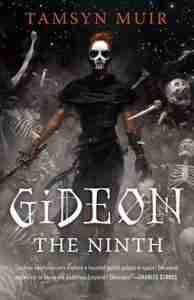 At its core, the Warhammer 40,000 universe is a story centred on a stricken empire in decline that’s desperately shoving every resource at its disposal between it and its own impending doom.
At its core, the Warhammer 40,000 universe is a story centred on a stricken empire in decline that’s desperately shoving every resource at its disposal between it and its own impending doom.
Plus science fantasy.
Gideon the Ninth is a bit like looking at the original fall of the old Imperium into Old Night, or the lead up to the Horus Heresy (depending on how far you want to stretch the imagination). There are excellent themes of historic betrayal ruining epic plans, of a very old emperor at the centre of an empire in strife testing necromancers and cavaliers to recruit in his elite corps to fight said betrayers, said emperor being a pretty horrible person despite having the fate of a population on his shoulders.
The execution, level of detail, and tone are where these two worlds are different. Gideon the Ninth has a very strong voice, with a lot of humour leavening the darkness and, beneath all the bones and angst, a thread of romance and focus on relationships that probably surpasses the foci on similar themes of the greater majority of Warhammer 40,000 books.
Did I mention it’s necromancers in space and therefore perfect for lovers of space fantasies?
If you’re somebody who loves these themes about Warhammer 40,000, and you are happy to stretch your boundaries a wee bit, then you’re going to love this brilliant space opera.
Read our review here.
About the bookThe Emperor needs necromancers.
The Ninth Necromancer needs a swordswoman.
Gideon has a sword, some dirty magazines, and no more time for undead nonsense.
Tamsyn Muir’s Gideon the Ninth, first in The Locked Tomb Trilogy, unveils a solar system of swordplay, cut-throat politics, and lesbian necromancers. Her characters leap off the page, as skillfully animated as arcane revenants. The result is a heart-pounding epic science fantasy.
Brought up by unfriendly, ossifying nuns, ancient retainers, and countless skeletons, Gideon is ready to abandon a life of servitude and an afterlife as a reanimated corpse. She packs up her sword, her shoes, and her dirty magazines, and prepares to launch her daring escape. But her childhood nemesis won’t set her free without a service.
Harrowhark Nonagesimus, Reverend Daughter of the Ninth House and bone witch extraordinaire, has been summoned into action. The Emperor has invited the heirs to each of his loyal Houses to a deadly trial of wits and skill. If Harrowhark succeeds she will be become an immortal, all-powerful servant of the Resurrection, but no necromancer can ascend without their cavalier. Without Gideon’s sword, Harrow will fail, and the Ninth House will die.
Of course, some things are better left dead.
Read Gideon the Ninth by Tamsyn MuirAction and brother/sisterhood: Stormblood by Jeremy SzalThe close relationships built in battle are one the key foundations that most Warhammer 40,000 books are written around. Be it the superhuman Astartes, the Sisters of Battle, or any wing of the Astra Militarum, when you pick up one of those books, you know you’ll be reading about soldiers going into hell and back for the defence of the Imperium.
It can be difficult to find those kinds of military relationships that are written with the right undercurrent of shared pain and terror and loss, with the right levity that comes with years spent by each other’s side and for better or worse, knowing your brother in battle. In Stormblood Szal really nails this feeling of brotherhood and all the fascets it comes in for sci-fi military characters.
For the Imperial purists who just want to scream “BURN” every time they see another alien race, this book might not be your jam, as Szal plays with plenty of pretty awesome alien species. If you can let that little bit go through to the keeper, however, then this might just be the type of romp for you. Imperial Guard / Astra Militarum fans: this recommendation is for you.
Read our review here.
About the bookVakov Fukasawa used to be a Reaper: a bio-enhanced soldier fighting for the Harmony, against a brutal invading empire. He’s still fighting now, on a different battlefield: taking on stormtech. To make him a perfect soldier, Harmony injected him with the DNA of an extinct alien race, altering his body chemistry and leaving him permanently addicted to adrenaline and aggression. But although they meant to create soldiers, at the same time Harmony created a new drug market that has millions hopelessly addicted to their own body chemistry.
Vakov may have walked away from Harmony, but they still know where to find him, and his former Reaper colleagues are being murdered by someone, or something – and Vakov is appalled to learn his estranged brother is involved. Suddenly it’s an investigation he can’t turn down . . . but the closer he comes to the truth, the more addicted to stormtech he becomes.
And it’s possible the war isn’t over, after all . . .
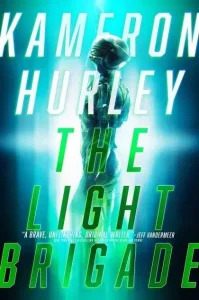 Empires hiding the truth from their soldiers and their citizens is probably one of the most human societal experiences out there. The price paid for that deception by the common grunt is the basis for so many books that giving you a scope for it would be like waving at the air–if you’re a Warhammer 40,000 fan, then every game you play, every book your read, every model you paint is based upon a ten millennia storyline started by a tiny group in power hiding the truth from their military leaders. So, you get what I mean.
Empires hiding the truth from their soldiers and their citizens is probably one of the most human societal experiences out there. The price paid for that deception by the common grunt is the basis for so many books that giving you a scope for it would be like waving at the air–if you’re a Warhammer 40,000 fan, then every game you play, every book your read, every model you paint is based upon a ten millennia storyline started by a tiny group in power hiding the truth from their military leaders. So, you get what I mean.
Hurley’s The Light Brigade is a brilliant military sci-fi story that is perfect for fans of the Imperium’s military might, the reason behind the wars, the grunt’s perspective of it, and, importantly, the human impact of it all.
If you loved Dan Abnett’s Gaunt’s Ghosts then this book is for you. If you care about the human cost to the military sci-fi battle awesomeness, then this is the book for you. If you want to read about the human cost of the wars driven by those in power like the Imperium’s many selfish factions, then pick up The Light Brigade by Kameron Hurley.
Read our review here.
About the bookThey said the war would turn us into light.
I wanted to be counted among the heroes who gave us this better world.
The Light Brigade: it’s what soldiers fighting the war against Mars call the ones who come back…different. Grunts in the corporate corps get busted down into light to travel to and from interplanetary battlefronts. Everyone is changed by what the corps must do in order to break them down into light. Those who survive learn to stick to the mission brief—no matter what actually happens during combat.
Dietz, a fresh recruit in the infantry, begins to experience combat drops that don’t sync up with the platoon’s. And Dietz’s bad drops tell a story of the war that’s not at all what the corporate brass want the soldiers to think is going on.
Is Dietz really experiencing the war differently, or is it combat madness? Trying to untangle memory from mission brief and survive with sanity intact, Dietz is ready to become a hero—or maybe a villain; in war it’s hard to tell the difference.
Read The Light Brigade by Kameron HurleyThat crushing cyberpunk hive city feeling: Neon Leviathan by T.R. Napper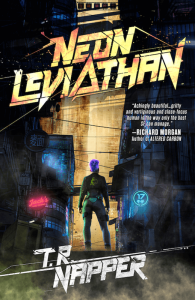 One of the most awesome things about the Imperium in Warhammer 40,000 are the hive cities in which untold trillions of people across billions of worlds live and die. If you stacked the entire population of earth in a city the size of England, with the rich at the very top in the clear air above, and the rest crushed into the ever debilitating layers below, your head would be in the right spot to appreciate these locations for stories.
One of the most awesome things about the Imperium in Warhammer 40,000 are the hive cities in which untold trillions of people across billions of worlds live and die. If you stacked the entire population of earth in a city the size of England, with the rich at the very top in the clear air above, and the rest crushed into the ever debilitating layers below, your head would be in the right spot to appreciate these locations for stories.
Napper’s stories are about the outcasts punching up. They are very human, with our limits and failures and crushed hopes and dreams laid bare for all to see. Napper’s varied characters and cyberpunk locations mixed with danger, violence, and a sense of moroseness that just at times reaches into your chest and squeezes is going to land really well for the more character-focussed fans of settings like Necromunda and Imperial hive cities.
As I’ve said above in the discussion on The Light Brigade and so many times before, for me, it’s the human characters that make Warhammer 40,000 what it is. It’s not the super soldiers or the tanks or the kilometres long void ships waging silent war above, it’s the people fed into the meatgrinder not only of war, but of the living body of the Imperium itself.
Read the reviews of Neon Leviathan over on Goodreads. You should also check out his novel set in the same universe 36 Streets–that underworld gang feel in a brutal cyberpunk setting just keeps getting dialled up.
About the bookA collection of stories about the outsiders – the criminals, the soldiers, the addicts, the mathematicians, the gamblers and the cage fighters, the refugees and the rebels.
From the battlefield, to alternate realities, to the mean streets of the dark city, we walk in the shoes of those who struggle to survive in a neon-saturated, tech-noir future. Twelve hard-edged stories from the dark, often violent, sometimes strange heart of cyberpunk, this collection – as with all the best science fiction – is an exploration of who were are now.
In the tradition of Dashiell Hammett, Philip K Dick, and David Mitchell, Neon Leviathan is a remarkable debut collection from a breakout new author.
Read Neon Leviathan by T.R. NapperBadarse inquisition-style characters: Altered Carbon by Richard K. MorganOne of the most brutal, clandestine, and action packed factions of the Warhammer 40,000 universe is the Inquisition. Characters like Dan Abnett’s Gregor Eisenhorn and Jurgen from Warhammer TV’s Interrogator have created this awesome kind of far-future grim AF Jack Bauer character. A levelled up version with blanket approval to torch entire planets to root out heresy.
The best example I can think of that stars a super badarse character with that amazing mix of detective noir, military action, and brutal cyberpunk is Richard K. Morgan’s Altered Carbon. Even better, Altered Carbon has been turned into a Netflix series to further immerse you in the kinds of worlds and stories that us 40k fans love to read about.
If the military action is more you jam, then worry not. Read this book and then immediately pick up book two, Broken Angels, which is essentially Vietnam war on another planet.
Read our review of Altered Carbon here.
About the bookIn the twenty-fifth century, humankind has spread throughout the galaxy, monitored by the watchful eye of the U.N. While divisions in race, religion, and class still exist, advances in technology have redefined life itself. Now, assuming one can afford the expensive procedure, a person’s consciousness can be stored in a cortical stack at the base of the brain and easily downloaded into a new body (or “sleeve”) making death nothing more than a minor blip on a screen.
Ex-U.N. envoy Takeshi Kovacs has been killed before, but his last death was particularly painful. Dispatched one hundred eighty light-years from home, re-sleeved into a body in Bay City (formerly San Francisco, now with a rusted, dilapidated Golden Gate Bridge), Kovacs is thrown into the dark heart of a shady, far-reaching conspiracy that is vicious even by the standards of a society that treats “existence” as something that can be bought and sold.
Read Altered Carbon by Richard K. MorganThe post What to read when you need a break from Warhammer 40,000 appeared first on Grimdark Magazine.

